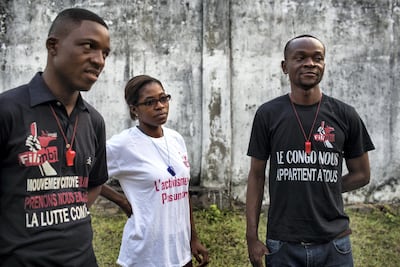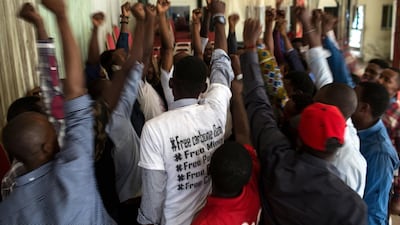In a bare classroom in the Ndolo neighbourhood of Kinshasa, a handful of young people take notes at ancient wooden desks.
Yves Diabikulwa paced the room and gestured dramatically as he instructed the listeners how to go about changing their country. “Everything starts from culture,” said the 23-year-old, delivering the lecture with the ease of a professor and the intensity of an activist. “Culture can change behaviour, which can change politics. If we can change the culture, we can change everything.”
This was not a school lesson. It was a Saturday, and outside in the sandy schoolyard, children played football. The gathering was a meeting for new members of Lutte Pour le Changement - or Struggle for Change, known as Lucha. It is a grassroots movement of young people pushing for democracy in the Democratic Republic of Congo.
Across this vast nation, pro-democracy groups like Lucha are growing, gaining followers despite the threat of arrest and death. But overcoming an entrenched political status quo is a daunting task, and their mobilisation capacity is limited. Still, their activism is building awareness in society, encouraging citizens to become engaged and demand a government that serves the people, instead of politicians.
Joseph Kongolo, head of the Center for Studies in Political Governance and Leadership in Kinshasa, said their activism contributed to the decision of Congo’s president of almost 18 years, Joseph Kabila, to step down after an election next week. “This is not a gift, but it’s due to the actions of the pro-democracy movements,” he said.
The government’s crackdown on the activists, arresting and jailing them, shows it considers them a serious threat, he said. The movements’ rejection of political parties and commitment to peaceful protest has won them followers in a country where many citizens are tired of years of conflict, and consider political parties corrupt.
The DRC, a central African nation larger than Western Europe, has vast reserves of mineral wealth, but its 80 million citizens are some of the poorest in the world. Since gaining independence from Belgium in 1960, corrupt authoritarian rulers and years of conflict have stunted development. Armed insurgencies rage in several regions of the country, and an Ebola outbreak in the east is now the second worst in history. Observers fear that deeper political instability could fuel wider conflict that could destabilise the entire region. A war in Congo from 1998 to 2003 drew in neighbouring countries and killed millions of people.

On Sunday voters will go to the polls to choose a new president. But the election is not a guarantee of real change. Mr Kabila chose as his preferred successor his former interior minister, Emmanuel Ramazani Shadary, who is under European Union sanctions for directing violent crackdowns on protesters. In interviews earlier this month, DRC’s longtime leader hinted he might run again in 2023, when permitted by the constitution.
The opposition and international observers have voiced strong concerns about the credibility of the election. Opposition candidates have been prevented from campaigning,including by police using live ammunition and tear gas to disperse their supporters. Security forces killed at least seven opposition supporters, wounded more than 50, and arbitrarily detained dozens of people last week, according to Human Rights Watch. Many Congolese fear the electronic voting machines, due to be deployed for the first time in an election here, could allow the government to rig the vote. A fire at a national electoral commission warehouse in Kinshasa last week reportedly destroyed thousands of the voting machines that were scheduled to be used in the capital, leading to fears the election could be postponed.
Speaking to The National, Communication Minister Lambert Mende insisted the persecution of political activists is not among his country's problems however. "I don't see anyone who has been arrested, and sued in court, just because of saying what he thinks," he said. "The activist has nothing to fear because if they did have something to fear, they could not [be] going and speaking with you openly as they are doing."
________________
Read more:
Nobel Peace Prize 2018 winners call for an end to rape in conflict
Fears over Ebola containment after deadly virus spreads to DRC city
Belgium's Africa museum: a fitting tribute or a testament to colonialism?
________________
The pro-democracy activists organised and participated in protests demanding Mr Kabila’s departure, but they have also built a following by focusing on more basic issues as well. Many people in the DRC struggle for access to electricity and clean water. In the capital, garbage is a persistent problem, festering in piles along roads and clogging drainage canals. Lucha activists often organise clean-ups in neighbourhoods across the city to serve their communities and highlight government failure. Such activities help them recruit, too. Eunice Etaka, a 25-year-old member, said the group always makes sure to work in public areas, and they pass out flyers to those who want to learn more. She helps lead the group that trains new members, known as the “Luchology” cell. One of the things that attracted her to the group was its “horizontal” structure – there is no leader who dictates decision to members. “Everyone is equal,” she said.

That the activists take people’s concerns seriously has given them credibility with citizens that politicians lack. Gloire Watshipa, 32, founded activist group Cocorico when he saw youth from his neighbourhood turning to drugs and gangs when they were unable to find jobs. Named for the sound a rooster makes, Cocorico aims to “wake up the people”, said Mr Watshipa.
“This situation has to change, and we are the ones who can change it, because we are the ones who experience this situation,” he said. “If I become a politician, my life will improve, but the remaining people’s lives will not change. That’s why we refuse politicians’ offers and keep struggling.” One of Cocorico’s activities is street protests urging taxi and bus drivers not to cheat passengers.

The commitment of activist groups to non-violence is significant in a country where dozens of rebel groups wage insurgencies. Activists have maintained that commitment despite being arrested, beaten, and imprisoned. Four members of pro-democracy group Filimbi, arrested while mobilising a protest calling for elections, are serving a year in prison. Alain Mulumba Kabeya, a 28-year-old Filimbi leader, said the activists will be watching the election closely, and are determined to keep up the pressure for real change.
With Mr Kabila’s promise to step down, “We can say that we have won one battle,” he said. “But our fight is not yet over.”
Reporting for this story was supported by the International Women’s Media Foundation

